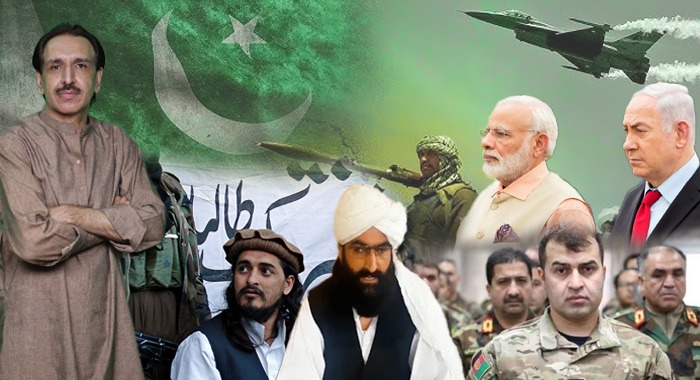Pakistan’s security landscape is unraveling faster than we dare admit. What was once seen as local insurgency, centred in Khyber Pakhtunkhwa (KP) and Balochistan, has morphed into a sprawling, interconnected conflict involving foreign intelligence agencies, ideological proxies, criminal syndicates, and systemic institutional failures. As the attacks mount and the blood flows, our response remains fragmented and reactive، an alarming mismatch to the scale of the threat.
Former Afghan intelligence chief General Sadat recently claimed that India has been funneling money to the Taliban’s Islamic Emirate, which in turn empowers the Tehreek-e-Taliban Pakistan (TTP). The mechanism is chillingly straightforward: foreign monies flow across borders, then reappear as bullets, bombs, and extortion payments targeting Pakistan. This is no fringe assertion, it follows a lineage traced in Mission R.A.W., authored by former Indian intelligence officer A.R. Yaldeve, alleging that since 1948, India has funded KP and Baloch nationalist movements to undermine Pakistan. More recently, reports emerged that Mullah Yaqoob, Afghanistan’s Defence Minister, accepts roughly INR 1 million monthly, a figure corroborated by multiple intelligence experts.
But the rot goes deeper. The failure of Afghan governance, from Karzai’s era through Ghani, has shown us that armies cannot substitute for legitimacy. Even with 300,000 soldiers, the Afghan regime collapsed within weeks. Purveyors of subversion didn’t need to fight fairly, they simply waited, and outlasted the system. Iran and India reportedly used proxy funding even then, infiltrating state institutions and strengthening networks designed to remain hidden until unleashed. Now those same networks are active across Pakistan.
Within KP, the vacuum is especially pronounced. According to recent security data, more than 1,377 violent incidents, including targeted killings, bombings, cross-border shelling, and intelligence-based ambushes، have occurred nationwide this year, with over 90% centred in Khyber Pakhtunkhwa. The human toll is staggering: over 1,500 civilians and security personnel died or were severely wounded. Bajaur alone experienced three major strikes in just ten days: the murder of political leader Khanzeb Khan, his sixth assassination attempt—followed by a prolonged six-hour standoff where militants destroyed a Frontier Corps vehicle and seized weapons. All while ISIS-K spreads deeper roots in the rugged border districts.
To make matters worse, Pakistan’s refugee crisis isn’t a minor issue, it’s a structural fault line. Millions of undocumented migrants, mainly Afghans but also Central Asians, slip through porous borders. Iran, once hospitable to certain refugee groups, has now expelled them, having arrested a Mossad agent who spent 25 years undercover. If Tehran can’t segregate friendly from hostile agents, how can we? Our own people, journalists, NGOs, even state functionaries, remain alarmingly unregistered and unsupervised, susceptible to manipulation by foreign powers.
Yet Pakistan’s government remains trapped in a cycle of post‑attack press conferences and committee briefings. Announcements about new policies are made, pledging to increase surveillance, tighten border control, or upgrade security equipment, but on the ground, militants continue to execute plans with chilling precision. Mufti Noor Wali Mehsud of the TTP has bluntly said that if whoever funds their jihad—even a foreign or Pakistani enemy, they will accept it. He didn’t mince words: this is mercenary insurgency in full public view.
Three critical failures now demand urgent remedy. First, our refugee and undocumented migration policies must prioritise national security, through registration, surveillance, and intelligence integration. Second, our security departments, police forces, intelligence agencies, and military, need genuine coordination, not bureaucratic silos. Third, the political leadership in KP and Islamabad must recognize this as a war in all but name, requiring a unified strategy that extends beyond scheduled meetings and election cycles.
If the state fails to act decisively, KP and Balochistan will continue sliding into lawlessness, becoming safe havens for proxy wars and extremists. Lives will be lost, but what’s at stake is far greater: the heart of the Pakistani state.
It’s time to move from reactive headlines to proactive action. This is not just a fight against terrorists, it’s a struggle for Pakistan’s future. The choice is stark: embrace decisive national unity now or watch the country fragment under the pressure of foreign-funded insurgency.





